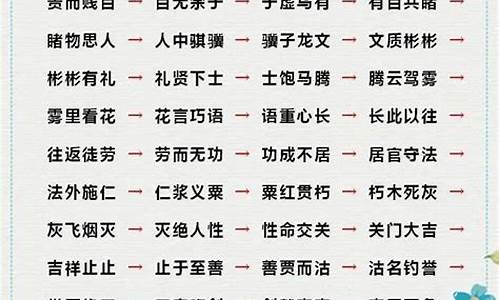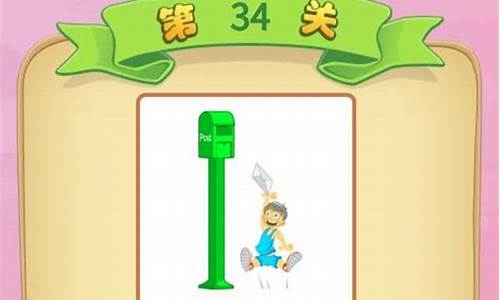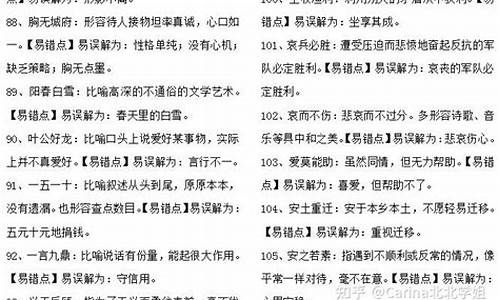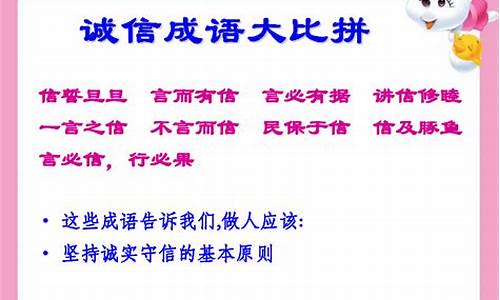您现在的位置是: 首页 > 成语解释大全 成语解释大全
用英语讲成语故事_用英语讲成语故事简短简单
ysladmin 2024-05-15 人已围观
简介用英语讲成语故事_用英语讲成语故事简短简单 大家好,很高兴有机会和大家一起探讨用英语讲成语故事的问题。我将用专业的态度回答每个问题,同时分享一些具体案例和实践经验,希望这能对大家有所启发。1.英语成语故事中
大家好,很高兴有机会和大家一起探讨用英语讲成语故事的问题。我将用专业的态度回答每个问题,同时分享一些具体案例和实践经验,希望这能对大家有所启发。
1.英语成语故事中英对照
2.英语版中国成语故事带翻译,短一点
3.谁有简单的英文成语故事?
4.用英语说成语故事急,要短的,长的不行
5.求四个字的成语故事英语的
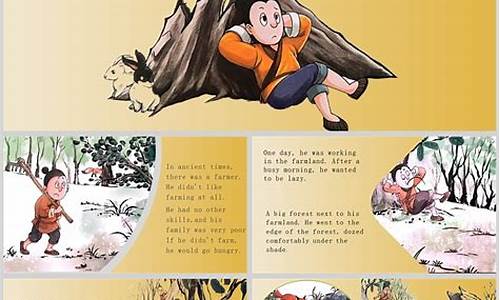
英语成语故事中英对照
如果觉得学英语觉得枯燥的话,可以加点乐趣的元素进去。我在此献上 英语 故事 ,希望对你有所帮助。成语 寓言故事 :Losing One's Head忘乎所以
The gorillas in the valleys in the south often lived together in groups of several tens. They were fond of drinking wine, and even fonder of imitating man's behavior.
南方山谷里的猩猩,常常数十成群地生活在一起。它们喜欢喝酒,更喜欢模仿人的行为。
People knew very well their habits and often put wine or distiller's grains on the roadside together with many straw sandals connected together with ropes.
人们掌握了它们的习性,经常把酒或酒糟放在路边,旁边又放着许多草鞋,草鞋用绳索连接起来。
The gorillas knew this was a trick to lure them into traps and cursed:
猩猩知道这是人们引诱它们上当,便破口大骂:
"Humph! Do you think we don't know your tricks? We'll never be taken in!"
?哼!你们以为我们不知道吗?我们决不上你们的当!?
So they called one another, turned round and left.
于是,互相招呼,回头就走。
But they had already smelled the aroma of the wine, and couldn't bear to part with it. Even after they left, they would turn their heads to look back. When they saw no one there, they would turn back; and after they turned back, they were afraid of being deceived, and left again. After much hesitation, they finally said to themselves:
但是,它们已经闻到了酒香,总有点恋恋不舍,就是走了,也要回过头来望望。回头望不见人,便又转过来;转过来了又怕上当,再返身回去。犹豫了好久,它们最后自言自语地说:
"Just for a taste of the wine. It won't matter as long as we don't get drunk."
?去尝尝味道,不喝醉就不碍事。?
Shortly afterwards, they agreed to come back to drink the wine. When they got drunk, they forgot everything. Every gorilla put on the straw sandals and imitated the way man walks.
不一会儿,大家同意了,都回来喝酒。等到喝醉的时候,它们一切都忘记了,一个个穿上草鞋,学着人走路。
As a result, they fell down one after another and were all caught alive by people.
结果,一个个都跌倒了,统统被人活捉。
成语寓言故事:A Half Day's Leisure半日清闲
One day, a high official wanted to amuse himself in a temple.
一天,有一个大官,要到寺院里去游玩。
His subordinates notified the monks in the temple three days in advance to prepare a good meal on time. So all the monks in the temple busied themselves with the preparation.
他的手下人便在三天前就通知寺院里的和尚,准时备好饭菜。于是,寺院里所有的和尚,都忙着张罗了起来。
The temple was situated in a remote mountain, surrounded by bamboo groves, and very tranquil. After the high official had strolled about for a while, he was very pleased. While dining, he recited lines from a poem of the Tang Dynasty:
寺院坐落在深山里,四面都是竹林,的确非常清静。大官游玩了一番之后,非常高兴,一面吃饭,一面吟起了唐人的诗句:
"Passing through the bamboo courtyard and meeting a monk,A half day's leisure is gained in this fleeting life."
?因过竹院逢僧话,又得浮生半日闲。?
When the old monk heard these lines of the poem, he couldn't help laughing.
老和尚听了诗句,不觉笑了起来。
The high official asked hastily:
大官连忙问道:
"What are you laughing about?"
?你笑什么
The old monk replied:
老和尚回答道:
"Your Honour have indeed gained a half day's leisure, but I have been busy for three whole days."
?您老人家固然清闲了半天,可是我老和尚却已经忙了整整三天!?
成语寓言故事:The Kingfisher Moves Its Nest翠鸟迁巢
In order to avoid calamities, at first the kingfisher always selects a high place to build its nest.
翠鸟起先为了避免灾祸,总是选择高的地方筑巢。
But when the young birds are hatched, it will move to a place a little lower to build its nest. This is because the kingfisher is particularly fond of its offspring and is afraid they而ght fall down from a high place.
但是,等到孵出小鸟以后,它就到少许低一点儿的地方筑巢。这是因为它特别爱护小鸟,生怕它们从高处摔下来。
When the young birds grow beautiful feathers, the kingfisher will become even fonder of them and more protective, so it will move its nest further downward, with the result that the young birds are easily taken away by people.
等到小鸟长出了美丽的羽毛以后,母鸟就更加喜欢和爱护它们了,于是又向下搬巢,结果小翠鸟却被人们轻而易举地掏走了。
英语版中国成语故事带翻译,短一点
笨鸟先飞A slow sparrow should make an early start.
不眠之夜white night
不遗余力spare no effort; go all out; do one"s best
不打不成交"No discord, no concord.
拆东墙补西墙rob Peter to pay Paul
大开眼界open one"s eyes; broaden one"s horizon; be an eye-opener
国泰民安The country flourishes and people live in peace
功夫不负有心人Everything comes to him who waits.
好了伤疤忘了疼once on shore, one prays no more
和气生财Harmony brings wealth
活到老,学到老One is never too old to learn.
既往不咎let bygones be bygones
金无足赤,人无完人Gold can"t be pure and man can"t be perfect.
金玉满堂Treasures fill the home
脚踏实地be down-to-earth
脚踩两只船sit on the fence
老生常谈,陈词滥调cut and dried, cliché
礼尚往来Courtesy calls for reciprocity.
留得青山在,不怕没柴烧"Where there is life, there is hope."
马到成功achieve immediate victory; win instant success
名利双收gain in both fame and wealth
茅塞顿开be suddenly enlightened
弄巧成拙be too smart by half; Cunning outwits itself.
拿手好戏masterpiece
赔了夫人又折兵throw good money after bad
抢得先机take the preemptive opportunities
强强联手win-win co-operation
瑞雪兆丰年A timely snow promises a good harvest.
人之初,性本善Man"s nature at birth is good.
人逢喜事精神爽Joy puts heart into a man.
人海战术huge-crowd strategy
世上无难事,只要肯攀登"Where there is a will, there is a way. "
世外桃源a fictitious land of peace away from the turmoil of the world;
死而后已until my heart stops beating
岁岁平安Peace all year round
塞翁失马,焉知非福Misfortune may be an actual blessing.
升级换代updating and upgrading (of products)
四十不惑Life begins at forty.
水涨船高When the river rises, the boat floats high.
时不我待Time and tide wait for no man.
杀鸡用牛刀break a butterfly on the wheel
说曹操,曹操到Talk of the devil and he comes.
实话实说speak the plain truth; call a spade a spade; tell it as it is
实践是检验真理的唯一标准Practice is the sole criterion for testing truth.
糖衣炮弹sugar-coated bullets
天有不测风云Anything unexpected may happen. a bolt from the blue
团结就是力量Unity is strength.
歪风邪气unhealthy practices and evil phenomena
物以类聚,人以群分Birds of a feather flock together.
望子成龙hold high hopes for one"s child
屋漏又逢连阴雨Misfortunes never come singly. When it rains it pours.
文韬武略military expertise; military strategy
唯利是图draw water to one"s mill
无源之水,无本之木water without a source, and a tree wiithout roots
无中生有make/create something out of nothing
徇私枉法bend the law for the benefit of relatives or friends
新官上任三把火a new broom sweeps clean
蓄势而发accumulate strength for a take-off
心想事成May all your wish come true
先入为主First impressions are firmly entrenched.
先下手为强catch the ball before the bound
像热锅上的蚂蚁like an ant on a hot pan
现身说法warn people by taking oneself as an example
息事宁人pour oil on troubled waters
喜忧参半mingled hope and fear
循序渐进step by step
鱼米之乡a land of milk and honey
有情人终成眷属"Jack shall have Jill, all shall be well."
有钱能使鬼推磨Money makes the mare go. Money talks.
有识之士people of vision
有勇无谋use brawn rather than brain
与时俱进advance with times
以人为本people oriented; people foremost
因材施教teach students according to their aptitude
欲速则不达Haste does not bring success.
优胜劣汰survival of the fittest
英雄所见略同Great minds think alike.
冤家宜解不宜结Better make friends than make enemies.
一言既出,驷马难追A real man never goes back on his words.
招财进宝Money and treasures will be plentiful
债台高筑become debt-ridden
致命要害Achilles" heel
众矢之的target of public criticism
纸上谈兵be an armchair strategist
纸包不住火Truth will come to light sooner or later.
谁有简单的英文成语故事?
塞翁失马Blessing or Bane
战国时期,靠近北部边城,住着一个老人,名叫塞翁。塞翁养了许多马,一天,他的马群中忽然有一匹走失了。邻居们听说这件事,跑来安慰,劝他不必太着急,年龄大了,多注意身体。塞翁见有人劝慰,笑了笑说:“丢了一匹马损失不大,没准会带来什么福气呢。”
邻居听了塞翁的话,心里觉得很好笑。马丢了,明明是件坏事,他却认为也许是好事,显然是自我安慰而已。过了几天,丢失的马不仅自动返回家,还带回一匹匈奴的骏马。 邻居听说了,对塞翁的预见非常佩服,向塞翁道贺说:“还是您有远见,马不仅没有丢,还带回一匹好马,真是福气呀。” 塞翁听了邻人的祝贺,反而一点高兴的样子都没有,忧虑地说:“白白得了一匹好马,不一定是什么福气,也许惹出什么麻烦来。” 邻居们以为他故作姿态纯属老年人的狡猾。心里明明高兴,有意不说出来。 塞翁有个独生子,非常喜欢骑马。他发现带回来的那匹马顾盼生姿,身长蹄大,嘶鸣嘹亮,膘悍神骏,一看就知道是匹好马。他每天都骑马出游,心中洋洋得意。 一天,他高兴得有些过火,打马飞奔,一个趔趄,从马背上跌下来,摔断了腿。邻居听说,纷纷来慰问。 塞翁说:“没什么,腿摔断了却保住性命,或许是福气呢。”邻居们觉得他又在胡言乱语。他们想不出,摔断腿会带来什么福气。 不久,匈奴兵大举入侵,青年人被应征入伍,塞翁的儿子因为摔断了腿,不能去当兵。入伍的青年都战死了,唯有塞翁的儿子保全了性命。Near China's northern borders lived a man well versed in the practices of Taoism. His horse, for no reason at all, got into the territory of the northern tribes. Everyone commiserated with him.
"Perhaps this will soon turn out to be a blessing," said his father.
After a few months, his animal came back, leading a fine horse from the north. Everyone congratulated him.
"Perhaps this will soon turn out to be a cause of misfortune," said his father.
Since he was well-off and kept good horses his son became fond of riding and eventually broke his thigh bone falling from a horse. Everyone commiserated with him.
"Perhaps this will soon turn out to be a blessing," said his father.
One year later, the northern tribes started a big invasion of the border regions. All able-bodied young men took up arms and fought against the invaders, and as a result, around the border nine out of ten men died. This man's son did not join in the fighting because he was crippled and so both the boy and his father survived.
用英语说成语故事急,要短的,长的不行
惊弓之鸟
Birds Startled by the Mere Twang of a Bowstring
战国时期(公元前403―221年中国中原地区各诸侯国连年争战的时代)魏国有个名叫更羸的人。一天,他对国王说:“我只要拉开弓,空射一下,就能把天上的鸟射下来。”国王不相信。更羸便对准天上飞来的一只雁射去,果真那只雁听到拉弦的声音就掉了下来。国王感到很奇怪。更羸说,“那是一只受过伤的雁。它一听到我拉开弓弦的声响,就惊慌得支持不住,自然要掉下来了。”
In the Warring States Period, there was a man in the State of Wei called Geng Lei. One day he said to the king: 'I can shoot down birds by simply plucking my bowstring.' When the king expressed doubt, Geng Lei pointed his bow at a wild goose flying in the sky, twanged the bowstring, and the goose fell to the ground. Geng Lei said, 'This goose has been hurt in the past. Hearing the twang of the bowstring, it assumed that it was doomed. So it simply gave up trying to live.'
“惊弓之鸟”这个成语比喻受过惊恐之后,有一点动静就特别害怕。
This idiom means that if one has been frightened in the past one's will may become paralysed in a similar situation.
毛遂自荐
Mao Sui Recommending Himself
战国时代,秦国军队攻打赵国的都城。赵国的平原君打算亲自到楚国去请救兵,想挑选一个精明能干的人一同前去。有一个名叫毛遂的人,自告奋勇愿意同去。平原君到楚国后,与楚王谈了半天,没有一点结果。毛遂怒气冲冲地拿着宝剑,逼近楚王,终于迫使楚王答应出兵,与赵国联合共同抵抗秦国。
In the Warring States Period, the State of Qin besieged the capital of the State of Zhao. Duke Pingyuan of Zhao planned to ask the ruler of the State of Chu personally for assistance. He wanted to select a capable man to go with him. A man called Mao Sui volunteered. When the negoti-actions between the two states were stalled because the ruler of Chu hesitated to send troops, Mao Sui approached him, brandishing a sword. At that, the ruler of Chu agreed to help Zhao, against Qin.
“毛遂自荐”这个成语用来比喻自己推荐自己,不必别人介绍。
This idiom means to recommend oneself.
世外桃源
A Haven of Peace and Happiness
东晋的文学家陶渊明写了一片著名的文章叫《桃花源记》。叙述一个渔人出外捕鱼的时候,偶然来到了桃花源这个地方。从这里通过一个山洞,发现了一个村子,这里的居民是秦朝时避难人的后代。这是一个与世隔绝、没有剥削和压迫、人人安居乐业的美好社会。渔人告别村民回家以后,再也找不到这个地方了。
Tao Yuanming, a famous writer of the Eastern Jin Dynasty (317-420), wrote the well-known essay Peach-Blossom Spring. In it he tells a story which goes like this: A fisherman happened to come upon a place called Peach-Blossom Spring. Squeezing through a cave, he found a village, the residents of which were descendants of refugees from the Qin Dynasty. It was a paradise isolated from the outside world, without exploitation or oppression, and everybody living and working in peace and contentment. The fisherman left the villagers and went home. But he could never find the place again.
后来,由这个故事产生了“世外桃源”这个成语,用来比喻与世隔绝的、理想的美好世界。
This idiom is derived from the above story, and is used to mean an isolated, ideal world.
南辕北辙
Going South by Driving the Chariot North
从前有个人要到南方去,他坐的车子却向北方行驶。过路人说:“你去南方,车子怎么向北行驶呢?”他回答说:“我的马很能跑路,我的车夫驾车的技术也很高明,加上我又带了充足的路费。”这个人没有考虑到,方向弄反了,他的条件越好,离他要去的地方就越远。
Once a man wanted to go to the south, but his carriage was heading north. A passer-by asked him: 'If you are going to the south, why is your chariot heading north? ' The man answered, 'My horse is good at running, my driver is highly skilled at driving a carriage, and I have enough money. ' The man didn't consider that the direction might be wrong; the better his conditions were, the further he was away from his destination.
后来人们就把这个故事概括为“南辕北辙”,比喻一个人的行为和他的目的正好相反。
The idiom derived from this story indicates that one's action was the opposite effect to one's intention.
画龙点睛
Putting the Finishing Touch to the Picture of a Dragon
南北朝(公元420--589)时期,有个画家叫张僧繇。有一次,他到一个寺庙去游玩,在墙壁上面画了四条龙,可是都没有画出眼睛。看画的人觉得很奇怪,问他为什么不画出眼睛。他说:“眼睛是龙的关键,画上眼睛,龙就会飞走了。”大家不相信他说的话。张僧繇拿起笔来,刚给两条龙点上眼睛,立刻电闪雷鸣,两条龙飞向天空,墙上只剩下两条没有画眼睛的龙。
In the Southern and Northern Dynasties Period (420-589), there was a painter called Zhang Sengyou. Once he visited a temple and painted on the wall four dragons, but gave none of them eyes. The onlookers felt that this was odd, and asked why he hadn't painted the eyes. He answered, 'Eyes are crucial for dragons. With the eyes painted on, the dragons would fly away.' Nobody believed this, so Zhang Sengyou took up his brush and added eyes to two of the dragons. No sooner had he finished than the two dragons flew into the sky amid a thunderstorm. The two without eyes stayed painted on the wall.
“画龙点睛”这个成语用来比喻讲话或写文章时,在关键地方加一两句重要的话,使内容更加生动有力。
This idiom is used to describe how, when writing or speaking, one or two key sentences will enhance the contents.
画蛇添足
Drawing a snake and Adding Feet
战国时代有个楚国人祭他的祖先。仪式结束后,他拿出一壶酒赏给手下的几个人。大家商量说:“我们都来画蛇,谁先画好谁就喝这壶酒。”其中有一个人先画好了。但他看到同伴还没有画完,就又给蛇添上了脚。这时,另一个人也画好了,夺过酒壶吧酒喝了,并且说:“蛇本来是没有脚的,你怎么能给它添上脚呢?”
In the Warring States Period, a man in the State of Chu was offering a sacrifice to his ancestors. After the ceremony, the man gave a beaker of wine to his servants. The servants thought that there was not enough wine for all them, and decided to each draw a picture of a snake; the one who finished the picture first would get the wine. One of them drew very rapidly. Seeing that the others were still busy drawing, he added feet to the snake. At this moment another man finished, snatched the beaker and drank the wine, saying, 'A snake doesn't have feet. How can you add feet to a snake? '
“画蛇添足”这个成语比喻做了多余而不恰当的事,反而把事情弄糟了。
This idiom refers to ruining a venture by doing unnecessary and surplus things.
班门弄斧
Showing Off One's Proficiency with the Axe Before Lu Ban the Master Carpenter
古代有一个建筑和雕刻技术非常高超的人,名叫鲁班,木匠行里尊称他为祖师。传说他曾用木头制作了一只五彩斑斓的凤凰,能够在空中飞翔三天不掉下来。在鲁班门前摆弄斧子,当然显得有些自不量力了。
Lu Ban was supposed to be a consummate carpenter in ancient times. It is said that he once carved a wooden phoenix that was so lifelike that it actually flew in the sky for three days. Thus it was considered the height of folly to show off one's skill with an axe in front of Lu Ban.
“班门弄斧”这个成语,用来比喻在行家面前显示本领。
This idiom excoriates those who show off their slight accomplishments in front of experts.
可爱多 2005-6-13 08:38
怒发冲冠
So Angry That One' s Hair Lifts Up One' s Hat
战国时代,赵国的大臣蔺相如出使到秦国。在他向秦王索回玉璧的时候,秦王蛮不讲理,蔺相如气愤得连头发都竖了起来,向上冲着帽子。
In the Warring States Period, Lin Xiangru, chief min-ister of the State of Zhao, was sent as an envoy to the State of Qin to ask the ruler of Qin to return a fine piece of jade to Zhao. But the ruler of Qin was rude and unreasonable. Lin was angry, and his hair stood up so stiffly on his head that it lifted up his hat.
后来人们用“怒发冲冠”这个成语形容人愤怒到了极点。
This idiom came to be used to mean being extremely angry.
画饼充饥
Allaying Hunger with Pictures of Cakes
三国时代魏国的皇帝曹睿,准备选拔一个有才能的人到朝廷来做官。曹睿对他的大臣说:“选择人才,不能光找有虚名的人。虚名好像是在地上画的一块饼,只能看,不能解决肚子饥饿的问题啊!”
In the Three Kingdoms Period (220-280), the king of the Wei, Cao Rui, wanted to select a very capable man to work for him. He said to his ministers: 'When choosing a talented person, always beware of one with a false reputation. A false reputation is just like a picture of a cake; it can' t relieve hunger.'
后来人们就用“画饼充饥”这个成语比喻用空想安慰自己,不能解决实际问题。
Later, this idiom came to be used to mean comforting oneself with unrealistic thoughts, without solving practical problems.
一鸣惊人
Amazing the World with a Single Feat
战国时代,齐威王即位后做了三年国君,只顾享乐,不理政事。有个善于说笑话的人叫淳于髡,一天对齐威王说:“城里有一只大鸟,三年不飞也不叫,你知道这是什么道理?”齐威王说:“这鸟不飞则罢,一飞就冲天;不鸣则罢,一鸣就惊人。”在淳于髡的激发下,齐威王开始治理国家,取得很大成绩,齐国的声威一直保持了几十年。
In the Warring States Period, Duke Wei of Qi neglected state affairs, for the first three years of his reign, giving himself over to dissipation. One of his ministers, Chun Yukun who had a good sense of humour, said to him: 'There is a big bird which has neither taken wing nor sung for three years.' The duke answered, 'Once that bird starts to fly and sing, it will astonish the world.' The duke thereupon devoted himself to his duties and built his state up into a powerful one.
“一鸣惊人”用来表示平时默默无闻,一旦行动起来,却做出惊人的成绩。
This idiom is used to indicate that a person may rise from obscurity and achieve greatness.
株待兔
Sitting by a Stump, Waiting for a Careless Hare
春秋时代,宋国有个农夫,一天在耕田的时候,忽然跑来一只兔子,恰巧碰在树桩上,脖子折断死了。农夫把兔子拾回家去,美美地吃了一顿兔肉。晚上他想:“我何必辛辛苦苦地种地呢?每天在树下能捡到一只兔子就够我吃的了。”于是,他从此不再耕作,每天坐在树下等待兔子的到来。
In the Spring and Autumn Period, a farmer in the State of Song was one day working in the fields when he saw a rabbit bump into a tree stump accidentally and break its neck. The farmer took the rabbit home, and cooked himself a delicious meal. That night he thought, 'I needn't work so hard. All I have to do is wait for a rabbit each day by the stump.' So from then on he gave up farming, and simply sat by the stump waiting for rabbits to come and run into it.
“守株待兔”这个成语,讥笑那些不想经过努力,存在侥幸心理,希望得到意外收获的人。
This idiom satirizes those who just wait for a stroke of luck, rather than making efforts to obtain what they need.
Zengzi Slaughters a Pig
曾子杀彘
engzi’s wife was going to the market. Her little son insisted on going with her, making a tearful scene. “Stay at home,” she said to the boy. “When I come back, I will slaughter a pig for you.” When she came back, Zengzi got ready to slaughter the pig. His wife stopped him, saying: “I was just kidding.” “A child is not to be kidded like that!” he replied. “A child does not know much and cannot judge for himself. He learns from his parents and listens to what they day. To lie to him is to teach him to lie to others. If a mother lies to her son, he will not trust her anymore. How is she then to educate him?” With that Zengzi went to slaughter the pig and prepare a good meal for their son.
曾子的妻子到集市上去, 他的儿子哭着要跟去. 他的母亲说: “你回家呆着,待会儿我回来杀猪给你吃.” 她刚从集市上回来, 曾子就要捉猪去杀. 妻子劝止他说: “只不过是跟孩子开玩笑罢了.” 曾子说: “不能跟孩子开玩笑啊! 小孩子没有思考和判断能力, 要想父母亲学习, 听从父母的教导. 现在你欺骗他,这是教孩子骗人啊! 母亲欺骗儿子, 儿子就不再相信自己的母亲了, 这不是实现教育的方法.” 于是曾子就杀猪煮肉给孩子吃.
狐假虎威
Basking in Reflected Glory
老虎在山林里捉到了一只狐狸,要吃掉它。狐狸连忙说:“你不能吃我,我是天帝派来统治百兽的。你要吃了我,就违抗了天帝的命令。你不信,就跟我到山林里去一趟,看百兽见了我是不是都很害怕。”老虎相信了狐狸的话,就跟在狐狸的后面走进山林。百兽见了果然都纷纷逃命。老虎以为百兽真的害怕狐狸而不知道是害怕自己,于是就把狐狸给放了。
A tiger caught a fox in a forest, and was just about to eat it, when the fox said, 'You mustn't eat me. I was sent by Heaven to rule the animals. By eating me, you will violate the command of Heaven. If you don't believe me, just follow me to see whether the animals are afraid of me.' The tiger agreed, and followed the fox as it walked around the forest. The animals all ran away on seeing them. The tiger thought they were afraid of the fox, so he let it go. He didn't realise that it was him that the beasts were really afraid of.
“狐假虎威”这个成语用来比喻倚仗别人的势力去欺压人或吓唬人。
This idiom means relying on another's power to bully or frighten others.
破镜重圆
A Broken Mirror Made Whole Agian
南朝陈国(公元557-589)将要灭亡的时候,驸马徐德言把一面铜镜破开,跟妻子各留下一半。双方约定:如果将来夫妻失散了,就把它当作信物。后来,夫妻二人真的失散了,凭借着各人留下的半面镜子,他们最终又得到团圆。
In the Northern and Southern Dynasties when the State of Chen (A.D. 557-589) was facing its demise, Xu Deyan, husband of the princess, broke a bronze mirror into halves. Each of them kept a half as tokens in case they were separated. Soon afterwards, they did lose touch with each other, but the two halves of the mirror enabled them to be reunited.
“破镜重圆”这个成语比喻夫妻失散或分离后重新团聚。
This idiom is used to refer to the reunion of a couple after they lose touch or break up.
一鼓作气
Rousing the Spirits with the First Drum Roll
春秋时代,齐国派兵攻打鲁国。鲁国的国王鲁庄公带着谋士曹刿指挥作战。齐军第一次击鼓以后,鲁军准备发起进攻。曹刿说:“不行。”齐军三次击鼓以后,曹刿才说:“现在可以进攻了。”结果齐军大败。战斗结束后,鲁庄公问曹刿胜利的原因。曹刿说:“打仗要考勇气。第一次击鼓,士气十分旺盛;第二次击鼓,士气有些衰落;第三次击鼓,士气就消耗尽了。敌人士气耗尽,我们发起进攻,所以取得了胜利。”
During the Spring and Autumn Period, an army from the State of Qi confronted one from the State of Lu. After the first roll of drums from the Qi side to summon Lu to battle, the Lu ruler wanted to attack. But his counsellor Cao Gui said, 'We should wait until the third drum roll, sire.' After the Qi side had beaten the drums three times, the Lu army attacked and defeated the Qi army. After the battle, the king asked Cao Gui the reason for his odd advice. Cao Gui answered, 'Fighting needs spirit. Their spirit was aroused by the first roll or the drums, but was depleted by the second. And it was completely exhausted by the third. We started to attack when their spirit was exhausted. That's why we won.'
后来,“一鼓作气”形容鼓起劲头,一下子把事情干完。
This idiom later meant to get something done with one sustained effort.
求四个字的成语故事英语的
画龙点睛。字面的意思是画龙之后再点上眼睛。这个成语多用于说话写作那么关于它的历史典故是怎样的呢?一起来看看吧:
Mr. Li is a good painter. One day he draws a beautiful dragon without eyes.
Mr. Zhou looks at the picture and says, “The dragon has no eyes. It isn’t a good picture.”
But Mr. Li smiles and says, “If I add eyes to the dragon, it will fly away.”
Mr. Zhou shakes head and says, “You are boasting. I don’t believe you.”
Mr. Li isn’t angry. He holds the paintbrush and adds eyes to the dragon. Woe! The dragon really flies.
李先生是位很好的画家。一天画了一条栩栩如生的龙,但是这只龙没有眼睛。
周先生见了说:“这条龙没有眼睛。这不算一张好画。”
可是李先生笑着说:“如果我给它加上眼睛,它就会飞走了。”
周先生摇头说:“你吹牛。我不相信。”
李先生也不生气,只是拿起笔给龙点上眼睛。哇!龙真的飞走了。
英语故事:破镜重圆
A Broken Mirror Joined Together
This set phrase metaphorically means the reunion of husband and wife after an enforced separation or a rupture.
At the end of Southern Dynasties,when the Chen Dynasty was about to be overthrown.
Xú Déyán felt very worried.He foreknew that his wife Princess Lè Chāng was destined to separate from him.
His wife is the last Emperor Chén Shūbǎo's younger sister.
Hence he broke a round bronze mirror into halves.
One half is given to the Princess,the other half left with himself.
The couple agreed on it that the wife would pretend to sell the broked mirror in the street of Cháng'ān,the capital of the Suí Dynasty,on the Lantern Festival.
After the fall of Chén Dynasty,Princess Lè Chāng was captured and sent to Chang'an and forced to be a concubine-servant in the mansion of Yáng Sù.
Xú Déyán missed his wife very much and went to the captial to look for her.
On the 15th day of the first lunar month,he found a man selling half the mirror.
After asking the man,he knew that his wife had been a concubine-servant of Yáng Sù. Thinking that he could not see her again,he sighed a great sorrow.
Having known the matter,Yáng Sù felt much sympathy for the couple.He sent for Xú Déyán and told him to take wife away.Thus the husband and the wife were reunited into a happy couple.
今天关于“用英语讲成语故事”的讨论就到这里了。希望通过今天的讲解,您能对这个主题有更深入的理解。如果您有任何问题或需要进一步的信息,请随时告诉我。我将竭诚为您服务。

